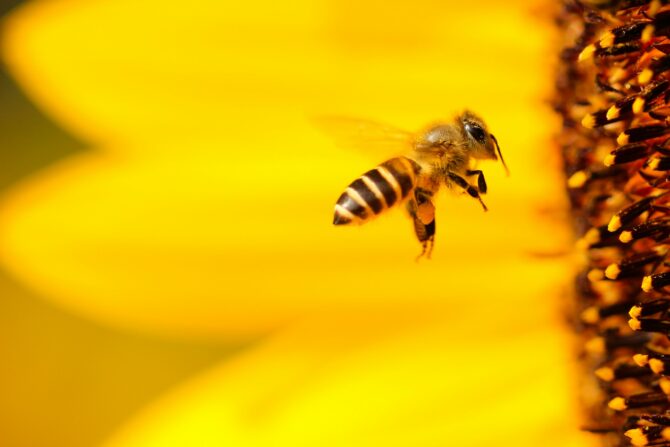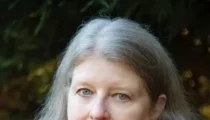She’d heated the ham in the fellowship hall that morning.…

Yellow Jackets
Seems you were born closer to an edge than the rest of us were. Seems you knew it too.
Seems maybe that was why, the bitter night you were born, you fought so hard against coming out. We roller-coasted fifteen miles of mountain road to the Richwood hospital at three a.m., and there you balked. “Turned funny,” the doctor said after all the wrenching and twisting, your birth the hardest of our mother’s six. “He was turned funny,” our mother’d say later, one of her twenty explanations for your “problems.”
When you were a baby, I was eight years old and already caring for kids. When I changed your clothes, your diaper, I’d stop and rub the little knot in your lower belly. I’d press on it. You’d just gaze back. A hernia, what you got for fighting being born. You came home already hurt that way.
■■■
By the time you were six, I’d seen you almost get killed at least twice. That, of course, didn’t count the ones I wasn’t there to see, but I was there for this:
A snowy Sunday afternoon, you about five years old, me twelve. The six of us doubled up on our sleds, a little one riding on a big one’s back: you on Sam, Jimmy on Catherine, and Laura on me bringing up the rear—our sleds tied in a train to the pickup’s back bumper. I remember quivering with excitement. I can feel the stretch of my mouth in its terrified grin, and our father guns the truck.
Then we’re crashing through the pasture, exhaust in our faces, spewed snow in our teeth, Laura’s arms choking my ribs, me gripping the sled crossbar for life. We are slamming grass hummocks, lifting, sailing, crashing back to the ground, the ecstatic reckless, the glorious out-of- control. Through slitted eyes, I see the fenceline coming, the scrub trees snow-hunched along it, I feel our father turn the wheel.
You flip off Sam and into the air.
I watch Catherine and Jimmy’s sled carve over your head. We’re screaming at our father, STOOOPPP!!!, but already my sled’s on you, I see you under me, your hat lost, my runners skidding your blond skull, my stomach passing over your body, then you’re gone . . . .
Our father finally brakes. We’re springing off our sleds and sprinting to you, are you crushed, did we murder you?—but you are already staggering to your feet. You shake off your arms, you look down at yourself, and you are saying, not yelling, saying, so it’s more to yourself than to us, and I hear the surprise in your voice: “I’m okay. I’m okay.”
■■■
The place we grew up was forty acres of ways to kill a kid. The South Branch River. Mill Creek. Abandoned outbuildings. Route 50. The woods. The train. The trestle.
My rescue nightmares started when I was a teen. Often, you, Jimmy, and Laura were in a bathtub together, laughing and playing, unaware that you’re all bleeding to death because your legs have been chopped off at your thighs. In an even more common one, we’re at the mouth of the creek behind our house, a hundred yards downstream of the trestle, and for a second, I glance away, and you or Jimmy slip in. I look back to see you turning over and over under water, your limbs rigid, a plastic doll. I crash into the creek and before I get to you, I wake up.
Strangely, in my trestle dreams, only I am in danger. A railroad trestle spanned Mill Creek a hundred yards from our house, tall as a church counting the steeple. The ties about eight inches apart, wide enough to terrify a kid with a view of the shallow creek below; close enough together that you couldn’t fall through. But the trestle had no railings, no sides. You could sure fall off. Still, the trestle was a vital shortcut, not using it to cross the creek meant long steep detours elsewhere. So we used the trestle anyway to get where we needed to go. In my trestle nightmares, the gaps between ties are so wide I have to jump between them. Most often, I get to the middle and find the whole rest of the bridge has dropped off, but I’m moving too fast to stop my fall.
■■■
This happened a couple years after the sled incident, but I didn’t know about it until Catherine confessed to me twenty years later. Catherine, ten, coerced you, seven, into a secret adventure involving a rope and a nearly vertical mountainside above the pasture. She told you to wait at the bottom, then climbed that hill face herself, and I can feel it, I climbed there often. The hemlocks and dogwood angling out, the limestone juts, Catherine would be relying on hands as much as feet. When she got pretty high, she threw down one end of the rope and told you tie it around yourself.
“I actually pulled him almost to the top before it happened,” she said. The knots you’d made around yourself gave. “I was scared to death, but all I could see was this orange jacket rolling over and over, bouncing off rocks and trees and logs. I was sure he was dead.” She shakes her head. “I have no idea why he never told on me.”
Another time, you weren’t yet two. I heard you wailing from a bedroom where you were supposed to be taking a nap. I found you on your knees in this old bassinet, a hand-me-down my parents got who knows where, your head stuck in a hole in the netting. I rushed to you. Grabbed the netting and wiggled you free, your hot scalp under my hand, perspiration-damp, and the tears and the snot. I realize now you weren’t in real danger of strangling, but I sure didn’t realize that then.
■■■
You’re nineteen for this one. It happened, like they say wrecks do, just a quarter mile from home. You blacked out in the back seat of a drunk friend’s car, the friend passing a semi on a Route 50 curve. The force of the guard rail slamming the door snapped your thigh before you were catapulted out, one finger nearly ripped off somewhere in that flight. Sometimes I imagine it like my eyes were implanted in the ceiling, watching you in murky slow motion: your leg buckled in metal, your snapped femur piercing your jeans, you sailing from there into the dark. But somehow your head stayed safe, your spine; just the broken leg and that finger, and even the finger rescued by a strip of skin. The next day, one of your drug buddies showed up at the house with your ballcap in his hands. He’d fetched it out of the hillside honeysuckle where you’d landed.
After the wreck come the decades of all the edges we’re not there to see. The ones we are forced to imagine, to dread, to await, to hear about from others, to be lied about by you, to piece together, to guess. One’s breath held always, the arrest, the dealer or buyer vandalizing or robbing the house, the fatal car accident, the overdose. For thirty years I’ve anticipated the phone call telling me you finally crossed the edge.
■■■
You told me this story yourself, one of those biannual conversations we’ve had during our adult lives. Your son Lucas was four at the time, so you must have been thirty-five. You and Lucas had been heading out of the woods through the hollow behind the house where you squatted. Early evening late October, day chilling down. You just happened to catch sight of some kind of insects mobbing the bottom of Lucas’s jeans, and when you kneeled to swat them off, you realized they were yellow jackets, sleepwalking, sluggish from the cool, but somehow still able to swarm. Then you saw them coating your own calves too, and you panicked, you swept up Lucas and sprinted to the house, scraping off bees as you ran.
As you told me this, you pulled Lucas closer on your lap. “But neither of us got stung.”
■■■
This edge is from Lucas’s perspective, him about three. I’m behind our parents’ house pushing him in circles on a Barbie Big Wheel our mother found at a yard sale. You’re thirty yards away “fixing” the roof of the detached garage, which is exactly what you were doing when I was here three months earlier. The garage stands at the back of the yard, its roof even with the elevated railroad embankment about ten feet from it. I’m bent over Lucas, my hands on top of his on the handlebars, running in dizzying laps, Lucas cackling with glee—when we hear the sightseeing train.
The tourist train that runs daily in fall for the leaf colors. The chug-roar of the locomotive slowly gathering speed after braking at the crossing over Route 50. Now we can see it passing over the trestle at about the speed of a person at a trot, and my mother is calling, “Look, Lucas, look! Wave, Lucas, wave!”
But Lucas has slammed down his feet to stop the Big Wheel. His eyes are fixed on the garage.
“Wave, Lucas, wave!”
Lucas scrambles off the Big Wheel so fast it tips over. “Da! Da!” he yells. He runs a few paces towards the garage, pointing at you. “Da! Da!”
Now Lucas is racing full-tilt towards you, his finger pointing and I chase after him, trying to understand his distress. Then he halts, his arms outstretched: “Da! Da!” I drop on my knees, loop my arm around his shoulders, and down here, I suddenly see what Lucas does.
From his vantage, the garage roof is flush with the railroad tracks—the actual gap between the building and the bank invisible—so that you on the roof are kneeling directly in the locomotive’s path. For Lucas, the train accelerates, you ignore it, the engine bears down, it’s within a couple body lengths of smashing your back, I grasp all this in an instant and pull Lucas to me, “It’s okay. It’s okay,” right as the train passes directly behind you, jolting everything back into proper perspective.
Lucas heaves under me. He does not cry. In the noise of the train and the nail gun, you never heard him. The cars hurtle behind you, tourist faces gawking. You pretend they aren’t there.
■■■
By the time you’re forty, your front teeth have softened and browned. By forty-five, your teeth are gone. Your thyroid is obliterated by thirty-eight, your esophagus eroded from “having nothing to do but lie down after I ate” in jail. Your hands haven’t stopped shaking since 1991, and fist-sized knots mushroom behind your knees. Some months you’re swollen big. Other months you’re filed down flat.
Your friends, your acquaintances, your customers, your dealers, die. Guns, exposure, blacked-out drives, corroded livers, suicide, murder. Overdoses. Overdoses. Overdoses. Overdoses. The brief oblique obituaries. The rumor rumbles that fill those in.
At forty-two, while accompanying your son and all your nieces and nephews into a rinky-dink amusement park, you collapse in the parking lot. Laura gets you to an ER. They rescue you from organ failure.
At forty-three, you go into organ failure again. Again the hospital saves you.
A few weeks before you turn forty-five, the Sunday after Thanksgiving 2015, you start to die in Laura’s old bed in the upstairs of our childhood home. I see the ruined mattress later, smeared and soaked with blood and shit, but at the time, only my mother and Lucas are there. My mother does not call an ambulance because you “might get mad,” until Lucas, fourteen, forces her to. That time you’re in intensive care for ten days.
That particular night of edge, I was 3000 miles west. I won’t learn what happened for three more days. But the night it did happen, I woke up stark, and this dream had no pictures, just a naked voice in my head: “There’s been a death.”
But there wasn’t.
■■■
The time I saw you come closest, I remember what you were wearing. Sears Toughskin burgundy jeans. Tennis shoes. No shirt. You were five or six, so I must have been twelve or thirteen. Our father—we always needed money—was trying to sell a piece of property on the other side of the creek. He and the attorney who was interested walked across the trestle to take a look, and some of us kids followed.
I can smell now the railroad tie creosote, an odor viscous and almost tart. I smell the summer creek below us, comforting to me, algae and rock, minnow and mud. The trestle ties are spaced so that if you are a bigger kid, you can hit a rhythm and cross them two at a time. If you are little, short-legged, like you were that summer, you have to take them at a stutter, one by one. Either way, the only way anyone can make it is by close control of where you look—and by not thinking too much. That muggy boring summer afternoon, we tail our father and the lawyer over, look at the land, turn around, and cross back.
I’m almost to the end of the trestle when I glance over my shoulder. Why I turn, I do not know, because you aren’t making a sound.
You’re alone in the middle of the trestle. Your knees high-kicking, your elbows wings, your silent mouth bawled open. I understand instantly: a yellow jacket nest. You pitch towards one unrailed edge, reel back, careen to the other side—catch yourself there. Your wrists flail, your legs jig, your naked belly, your small self against the long curve of track behind you, the rocky thread of creek a million feet below. And me—I’m paralyzed. I can’t run to you without using my eyes to place my feet—but I can’t take my eyes away from you about to fall.
You are my little brother. I cannot reach you. Once again, you hold the edge. ■


